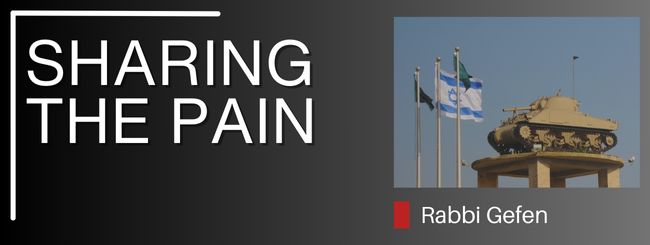Vayeshev (Genesis 37-40 )
Bereishis, 37:34-5: “And Yaakov tore his clothing, and he wore sackcloth on his loins, and he mourned his son for many days. And all his sons and daughters rose up to console him [Yaakov] and he refused to be consoled and he said, ‘because I will go to the grave because of my son’; and his father cried for him.”
Rashi, Dh: And his father cried for him: “Yitzchak was crying because of Yaakov’s pain, but he did not mourn, because he knew that he [Yosef] was alive.”
After being informed of the apparent death of his son, Yosef, Yaakov descends into a lengthy period of deep mourning for his favorite son. The verse describing Yaakov’s mourning ends with a seemingly superfluous clause, “and his father cried for him”. Rashi, based on Chazal teaches that this is not referring to Yaakov crying for his son, rather it is about Yitzchak crying for his son, Yaakov. Rashi explains that Yitzchak knew that Yosef was actually alive,1 but he also knew that he could not reveal this to Yosef because the brothers had made an oath that nobody could reveal this information. Yitzchak understood that he was bound by this oath. This is why the Torah states only that Yitzchak cried, but not that he mourned. Moreover, the commentaries explain that Yitzchak was not crying about Yosef since he knew that he was still alive, rather he was crying about the pain that Yaakov was enduring because he thought that Yosef had died. The Gur Aryeh adds that Yitzchak cried only when he was with Yaakov, but not when he was out of Yaakov’s presence.
The Chiddushei Lev2 brings a Midrash3 that elaborates on this explanation: “R’Levi and R’Simon said, that ‘by him [Yaakov], he [Yitzchak] was crying but when he left him, he went and washed, anointed himself, ate and drank.” It is evident from the Midrash that Yitzchak only cried when he was with Yaakov in order to share in his pain, but when he was not with Yaakov, he acted normally.
The Chiddushei Lev asks, why did Yitzchak not cry even when he was out of Yaakov’s presence, in order to share in his pain.4 He answers, that we learn from here that there are times when a person should share in his fellow’s pain, and there are times when he should not. The reason that there are times that one should not focus on feeling his fellow’s pain is because we are required to serve God with joy and with all our powers. One who is constantly focusing on other people’s pain is unable to do this.5 Accordingly, Yitzchak fixed a certain amount of time to empathize with Yaakov’s pain and in that time, he totally felt Yaakov’s pain and consequently cried with his son. However, when he left Yaakov, he would not think about Yaakov’s pain and would focus on his own Divine service.
The Chiddushei Lev adds that we learn from here that when a fellow Jew is suffering, we should follow Yitzchak’s approach and try to completely share in his pain when with him, but to continue functioning when without him. He then addresses the common situation when a person can never actually be with the person suffering. In such a case, he suggests that one should still set aside a fixed amount of time to contemplate that person’s suffering and share his pain as much as possible. Yet, at other times, one should strive to function normally.
This lesson is sadly, highly pertinent at this time of suffering for the Jewish people, when well over a thousand people have been killed, and well over two hundred are hostages to our evil enemy. In addition to the pain of these victims themselves, there are of course many more relatives and friends who are enduring great suffering as well. Most of us are not directly related to these people, and so, after the initial shock, there may be a tendency to become ‘used to’ the situation. However, we learn from the Chiddushei Lev, that it is incumbent upon us to spend some time each day, trying in some way to share in their suffering. At the same time, it does not help anyone to go the other extreme and spend all our time thinking about their pain, as it hinders our ability to function and indeed to help in whatever way we can.
May we merit that all Jews should merit to be safe and healthy.
By Rabbi Yehonasan Gefen
Notes:
- Through ruach hakodesh.
- Chiddushei Lev, Bereishis, 37:35.
- Bereishis Rabbah, 84:21.
- Evidently, the Chiddushei Lev in his question, understands that the purpose of sharing in one’s pain, is not just to show him empathy as that would only be relevant when they are together. Rather, he understands that in theory, there is a maaleh to feeling someone’s pain even when it does not directly help that person.
- In this vein, my Rebbe, Rav Yitzchak Berkovits shlit’a relates that his Rosh Yeshiva, Rav Chaim Shmulevits zt”l, was so sensitive to the pain of others, that if he ever heard of a death of any Jew, he would cry for several hours, and would not be able to focus on his learning. Therefore, the people around him made a concerted effort to prevent him from hearing or seeing any news.
© Copyright, all rights reserved. If you enjoyed this article, we encourage you to distribute it further.
Our blogs may contain text/quotes/references/links that include copyright material of Mechon-Mamre.org, Aish.com, Sefaria.org, Chabad.org, and/or AskNoah.org, which we use in accordance with their policies.
